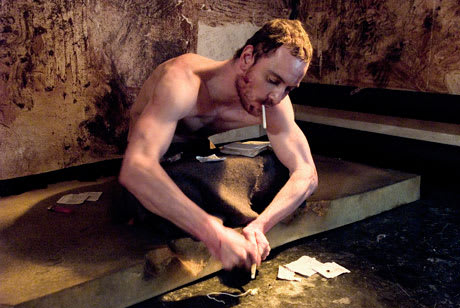Steve McQueen's debut feature, re-released on Blu-Ray to coincide with the release of Shame, is still a magnificent introduction to former new media artist and designer Steve McQueen (no relation to the Bullitt star) and an impassioned story about the 1981 hunger strike by Irish revolutionaries in Maze Prison. Passion and intensity overcome the rather orthodox narrative; it's hard to ignore the misleading flow, which can confuse the casual viewer. McQueen initially introduces us to Raymond Lohan (Stuart Graham), a prison guard we watch go about his mundane morning routine: showering, getting dressed, eating breakfast and, lastly, checking under his car for bombs before going to work. Once at work, McQueen goes into the details of his exhausting task of overseeing a group of miscreant prisoners united in the name of Irish freedom against their captors. McQueen then switches to the POV of Davey Gillen, a boyish-looking, incumbent inmate identified as having a nonconforming attitude. Once in his cell, which has been grotesquely decorated with faeces by his new mate, Gerry Campbell, we realize Gillen has entered a new kind of hell. And yet, the film isn't about Gillen, Campbell or Raymond the prison guard. Finally after a ceremonial beat down session by the guards, we glimpse Bobby Sands for the first time, who will takeover the film from hereon in. First, we see him as a feral beast of a man, with long hair and a long beard, being dragged kicking and screaming to get his hair cut. At the end of the ordeal, we see Sands the man for the first time, cut and bruised but absolutely resolute in his determination. In the context of cinema history, it's also a magnificent introduction to Michael Fassbender the actor and Hollywood star in the making. Fassbender's embodiment of Sands' unbelievable dedication of mind and body to the cause of Irish freedom has the same kind of visceral power as Robert De Niro's Jake LaMotta or Brando's beatings in On the Waterfront. The final act, wherein Sands wastes away on a bed, refusing all food, is brought to life by McQueen in the most uncompromisingly painful manner. And yet, at the moment of his death it's an existential, ethereal moment, beautiful and serene. After Sands takes over the picture we never see Gillen again, nor Campbell, nor the young Swat member who guides us through the harrowing riot sequence. As such, upon my first viewing, I was admittedly confused, not knowing who to follow. But looking back, McQueen's intentions are clear. Hunger is not a political film, but a work about effect of the Irish conflict from all sides, sympathizing with everyone engaged in the fight, whether it's Sands' voluntary commitment or the guards just trying to make a living. Everyone suffers in Hunger, but in the process enlightening us to the power of our resolve and commitment. The Alliance Blu-Ray is devoid of special features, which makes the Criterion Collection Blu-Ray the keeper for collectors, but McQueen's immaculately controlled visual colour palette looks as beautiful in high definition and thus is worth every penny.
(Alliance)Hunger
Steve McQueen

BY Alan BacchusPublished May 8, 2012